Related Research Articles
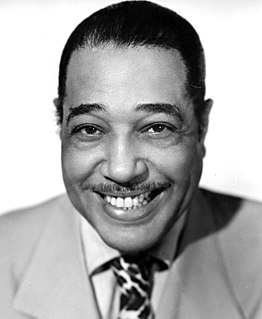
Edward Kennedy "Duke" Ellington was an American jazz pianist, composer, and leader of his eponymous jazz orchestra from 1923 through the rest of his life. Born and raised in Washington, D.C., Ellington was based in New York City from the mid-1920s and gained a national profile through his orchestra's appearances at the Cotton Club in Harlem. A master at writing miniatures for the three-minute 78 rpm recording format, Ellington wrote or collaborated on more than one thousand compositions; his extensive body of work is the largest recorded personal jazz legacy, and many of his pieces have become standards. He also recorded songs written by his bandsmen, such as Juan Tizol's "Caravan", which brought a Spanish tinge to big band jazz. At the end of the 1930s, Ellington began a nearly thirty-year collaboration with composer-arranger-pianist Billy Strayhorn, whom he called his writing and arranging companion. With Strayhorn, he composed multiple extended compositions, or suites, as well as many short pieces. For a few years at the beginning of Strayhorn's involvement, Ellington's orchestra featured bassist Jimmy Blanton and tenor saxophonist Ben Webster and reached a creative peak. Some years later following a low-profile period, an appearance by Ellington and his orchestra at the Newport Jazz Festival in July 1956 led to a major revival and regular world tours. Ellington recorded for most American record companies of his era, performed in and scored several films, and composed a handful of stage musicals.
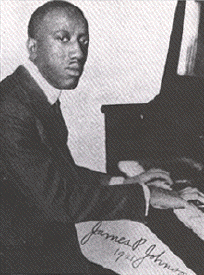
James Price Johnson was an American pianist and composer. A pioneer of stride piano, he was one of the most important pianists in the early era of recording, and like Jelly Roll Morton, one of the key figures in the evolution of ragtime into what was eventually called jazz. Johnson was a major influence on Count Basie, Duke Ellington, Art Tatum, and Fats Waller, who was his student.
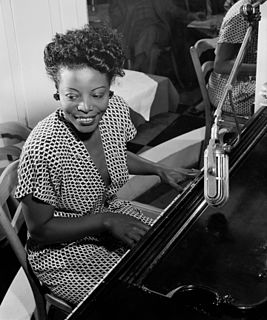
Mary Lou Williams was an American jazz pianist, arranger, and composer. She wrote hundreds of compositions and arrangements and recorded more than one hundred records. Williams wrote and arranged for Duke Ellington and Benny Goodman, and she was friend, mentor, and teacher to Thelonious Monk, Charlie Parker, Miles Davis, Tadd Dameron, Bud Powell, and Dizzy Gillespie.

William Thomas Strayhorn was an American jazz composer, pianist, lyricist, and arranger, who collaborated with bandleader and composer Duke Ellington for nearly three decades. His compositions include "Take the 'A' Train", "Chelsea Bridge", "A Flower Is a Lovesome Thing", and "Lush Life".

Lawrence Brown was a jazz trombonist from California best remembered for his work with the Duke Ellington orchestra. He was a session musician throughout his career, and also recorded albums under his own name.

Alfred McCoy Tyner was an American jazz pianist and composer known for his work with the John Coltrane Quartet and his long solo career afterwards. He was an NEA Jazz Master and five-time Grammy award winner. Unlike many of the jazz keyboardists of his generation, Tyner very rarely incorporated electric keyboards or synthesizers into his work. Tyner has been widely imitated, and is one of the most recognizable and influential pianists in jazz history.

Abdullah Ibrahim is a South African pianist and composer. His music reflects many of the musical influences of his childhood in the multicultural port areas of Cape Town, ranging from traditional African songs to the gospel of the AME Church and Ragas, to more modern jazz and other Western styles. Ibrahim is considered the leading figure in the subgenre of Cape jazz. Within jazz, his music particularly reflects the influence of Thelonious Monk and Duke Ellington. He is known especially for "Mannenberg", a jazz piece that became a notable anti-apartheid anthem.

David Kenneth Ritz Van Ronk was an American folk singer. An important figure in the American folk music revival and New York City's Greenwich Village scene in the 1960s, he was nicknamed the "Mayor of MacDougal Street".

Billy Taylor was an American jazz pianist, composer, broadcaster and educator. He was the Robert L. Jones Distinguished Professor of Music at East Carolina University in Greenville, and from 1994 was the artistic director for jazz at the John F. Kennedy Center for the Performing Arts in Washington, D.C.

Adam Makowicz is a Polish pianist and composer living in Toronto. He performs jazz and classical piano pieces, as well as his own compositions.

George Mesrop Avakian was an American record producer, artist manager, writer, educator and executive. Best known for his work from 1939 to the early 1960s at Decca Records, Columbia Records, World Pacific Records, Warner Bros. Records, and RCA Records, he was a major force in the expansion and development of the U.S. recording industry. Avakian functioned as an independent producer and manager from the 1960s to the early 2000s and worked with artists such as Louis Armstrong, Miles Davis, Duke Ellington, Benny Goodman, Dave Brubeck, Eddie Condon, Keith Jarrett, Erroll Garner, Buck Clayton, Sonny Rollins, Paul Desmond, Edith Piaf, Bob Newhart, Johnny Mathis, John Cage, Alan Hovhaness, Ravi Shankar, and many other notable jazz musicians and composers.
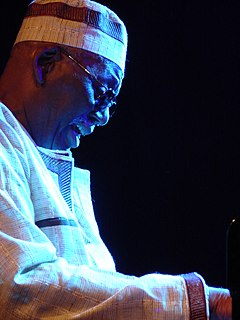
Randolph Edward "Randy" Weston was an American jazz pianist and composer whose creativity was inspired by his ancestral African connection.

Mulgrew Miller was an American jazz pianist, composer, and educator. As a child he played in churches and was influenced on piano by Ramsey Lewis and then Oscar Peterson. Aspects of their styles remained in his playing, but he added the greater harmonic freedom of McCoy Tyner and others in developing as a hard bop player and then in creating his own style, which influenced others from the 1980s on.
Britt Woodman was an American jazz trombonist.
Willie Ruff is an American jazz musician, specializing in the French horn and double bass, and a music scholar and educator, primarily as a Yale professor from 1971 to 2017.

Sam Woodyard was an American jazz drummer.

James Louis Chirillo is an American jazz guitarist, banjoist, composer, arranger, and band leader.
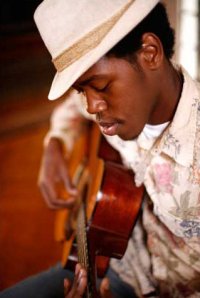
Christylez Bacon is a hip hop music artist and multi-instrumentalist from Southeast Washington, Washington, DC.
The Smithsonian Jazz Masterworks Orchestra (SJMO) is the national jazz orchestra of the United States. It is based at the National Museum of American History in Washington, D.C., where it is the orchestra-in-residence. The SJMO was founded in 1990 with the dual mission of performing and preserving American jazz masterworks and raising public awareness and understanding of the genre.
Sacred jazz is jazz composed and performed with religious intent.
References
- 1 2 3 4 "Village Salon With John Eaton, Pianist - Events - Foggy Bottom West End Village". Foggy Bottom West End Village. 2015. Retrieved 2022-05-11.
- 1 2 3 "John Eaton: Pianist of the Great American Songbook". The Georgetowner. 2013-02-19. Retrieved 2022-05-11.
- 1 2 3 4 5 6 Kelly, John (November 6, 2019). "Celebrating decades of music from the fingers of piano man John Eaton". The Washington Post. Retrieved May 10, 2022.
- ↑ Smithsonian archives
- ↑ Wolftrap Archived 2007-10-15 at the Wayback Machine
- ↑ schedule Archived 2007-07-03 at the Wayback Machine